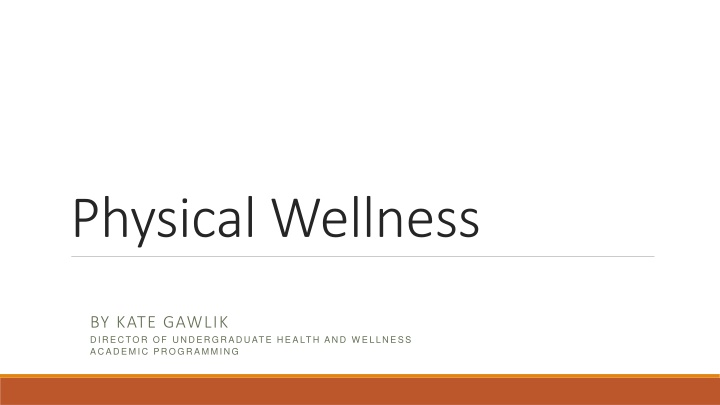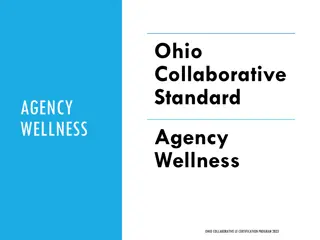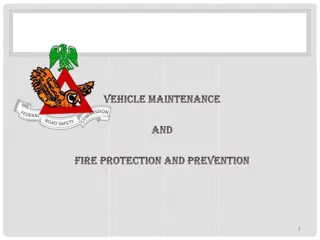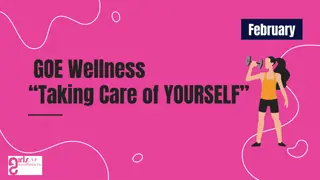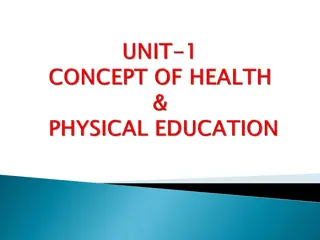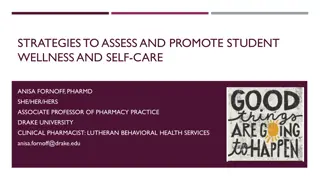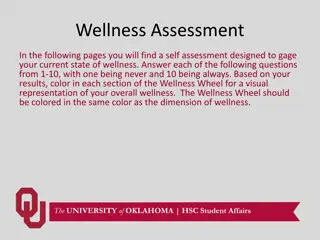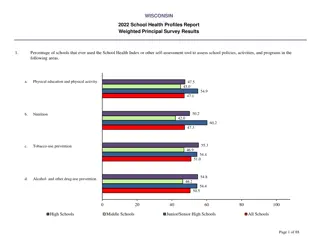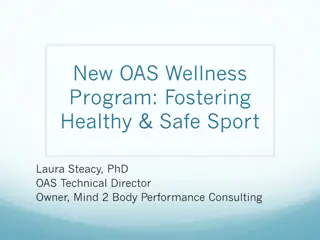Importance of Physical Wellness in Health Maintenance
Physical wellness, as emphasized by Kate Gawlik, involves caring for the body through exercise, healthy eating, stress reduction, and more. Regular physical activity, such as aerobic and muscle-strengthening exercises, offers numerous health benefits, including reducing the risk of chronic diseases like diabetes and heart disease, improving mental health, and enhancing overall quality of life. By engaging in moderate and vigorous physical activities, individuals can significantly enhance their well-being and longevity.
Download Presentation

Please find below an Image/Link to download the presentation.
The content on the website is provided AS IS for your information and personal use only. It may not be sold, licensed, or shared on other websites without obtaining consent from the author.If you encounter any issues during the download, it is possible that the publisher has removed the file from their server.
You are allowed to download the files provided on this website for personal or commercial use, subject to the condition that they are used lawfully. All files are the property of their respective owners.
The content on the website is provided AS IS for your information and personal use only. It may not be sold, licensed, or shared on other websites without obtaining consent from the author.
E N D
Presentation Transcript
Physical Wellness BY KATE GAWLIK DIRECTOR OF UNDERGRADUATE HEALTH AND W ELLNESS ACADEMIC PROGRAMMING
What is physical wellness? Care of the physical body Exercise Healthy Eating Smoking cessation Alcohol reduction Adequate Sleep Stress reduction Health maintenance
Exercise is medicine Heart Health: Cancer: Diabetes: Urine: Lowers blood pressure Lowers the risk for heart attack and stroke Lowers the risk for breast, colon, prostate and other cancers Helps prevent diabetes Lowers blood sugar in people who have diabetes Improves urine control
Exercise is medicine Depression & Anxiety: Muscles and joints: Bones: Sexual/Reproductive: Maintains and increases muscle strength and flexibility Reduces pain and improves function in many people with arthritis Prevents bone loss Increases bone strength Improves erectile function in men and sexual interest and enjoyment in men and women Can increase fertility and may make pregnancy safer Helps reduce obesity and increase resting energy (metabolism) Very important part of maintaining weight loss
Exercise is medicine Helps manage and prevent chronic disease: Helps prevent diabetes Helps manage chronic disease, like diabetes and heart disease Losing 5-10% of your starting weight mood and energy balance, lowers risk of falls thinking and may prevent dementia Energy lifespan Overall Improves:
Exercise Aerobic activity at least 150 minutes per week of accumulated moderate intensity or 75 minutes per week of vigorous intensity aerobic physical activity (or an equivalent combination of moderate and vigorous activity Muscle-strengthening activity (such as resistance or weights) at least 2 days per week Flexibility Training >2-3 sessions per week with daily being most effective
Moderate Physical Activity Vigorous Physical Activity Walking briskly (about 3 miles per hour) Running/jogging (5 miles per hour Bicycling (less than 10 miles per hour) Walking very fast (4 miles per hour) General gardening (raking, trimming shrubs) Bicycling (more than 10 miles per hour) Dancing Heavy yard work, such as chopping wood Golf (walking and carrying clubs) Tennis (doubles) Water aerobics Sports where you catch and throw Swimming (freestyle laps) Aerobics Basketball (competitive) Tennis (singles) ( baseball, softball)
Healthy eating Increase fruits and vegetables Decrease processed foods and sugary beverages Reduce red meat and processed meat Avoid white flour, stick to whole grains Incorporate healthy fats Avoid fast food Try following the Mediterranean or DASH diet
Smoking and alcohol No more than 2 drinks a day for men and 1 drink per day for women If you smoke or use nicotine, quit! IT IS NEVER TOO LATE 1-800-QUIT-NOW 1 beer (12 oz) 1 glass of wine (5 oz) 1 shot of hard liquor (1.5 oz)
Sleep Adults need 7 or more hours of sleep per night Good sleep quality is also essential
Stress reduction Find healthy ways to practice stress reduction Develop positive coping mechanisms Practice self care
Health maintenance including Regular checkups Age-appropriate screenings per the United States Preventive Services Taskforce Dental exams Visits with mental health care providers (if applicable)
Challenge for physical wellness HOW CAN YOU FOCUS ON YOUR BODY THIS WEEK?
